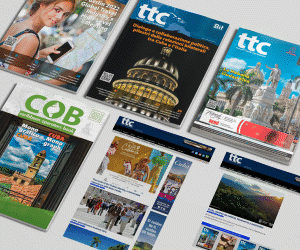By Frank Martin
The Covid-19 pandemic is receding, but for the world and the tourism industry another dangerous and complex goal remains active: a winning battle against climate change.
Experts argue that this type of war needed to protect nature may not be successful if it is not addressed now.
This month, the United Nations Conference on Climate Change in 2021 took steps in the right direction with the organization of the 26th conference of the parties to the world body’s Framework Convention on Climate Change, dubbed COP26.
The summit considers that the climate is changing directly or indirectly due to human activity that alters the composition of the world’s atmosphere and therefore worsens the regular changes that occur naturally on the planet.
These science-proven concepts are not accepted by some very powerful global industrial sectors that refuse to feel guilty about environmental pollution.
Controversial criteria were also heard even at the summit. Negotiators at the Glasgow climate change summit face a ‘monumental challenge’ to reach a credible agreement,” warned COP26 president Alok Sharma last Thursday shortly before the meeting ended.
At that time, officials hoped to obtain a text supported by all by the end of the summit and were looking for agreement on the details.
The international tourism industry faces these climatic changes not only to fulfill a duty but also because it needs the well-being of nature for its main activities.
Those are the reasons that led the World Travel and Tourism Council to launch the Net Zero Roadmap this month.
The presidency of COP26 launched a first draft in which it asks governments not to wait for the maximum deadline of 2025 set in the Paris Agreement to present new emission cuts.
The meeting at the Scottish Event Campus Source in Glasgow focused on the most effective ways to ask countries to toughen up their plans to immediately reduce greenhouse gas emissions.
The lawsuit went to the signatories of the Paris Agreement asking for cuts for this decade in their emissions to achieve the objective that the increase in temperature remains between 1.5 and 2 degrees with respect to pre-industrial levels.
This request is peremptory because if current plans are maintained, it would cause global warming of between 2.4 and 2.7 degrees, according to scientific studies.
The final alternative to these measures could be sinister. Would tourism be possible in an uninhabitable world?
The obvious answer to that question is just one: No.
If Covid-19 pandemic has proven anything, it is that humanity’s bond with nature is a life and death one. Without a natural well-being, not only is there no tourist well-being, but of the entire planetary population.
International experts point out that the COP26 project shows essential paths, guidelines and recommendations to guide the universal tourism industry until it reaches the goal of decarbonizing and reaching net zero by 2050.
The sectors most committed to nature in the face of climate change believe Glasgow will be the last chance to save planet Earth from climate effects even more devastating than those seen recently as droughts, floods and extreme heat waves.
The roadmap presents a new framework of objectives as decontamination corridors with tourism companies included in three groups, based on their emission profiles and the difficulty of reducing their GHG emissions.
Surely, consequences of climate change can even be more monstrous than those caused by Covid-19.
Soon the coronavirus will be finally eradicated or reduced to limits, while the climate change could turn catastrophically irreversible.

MORE NEWS











